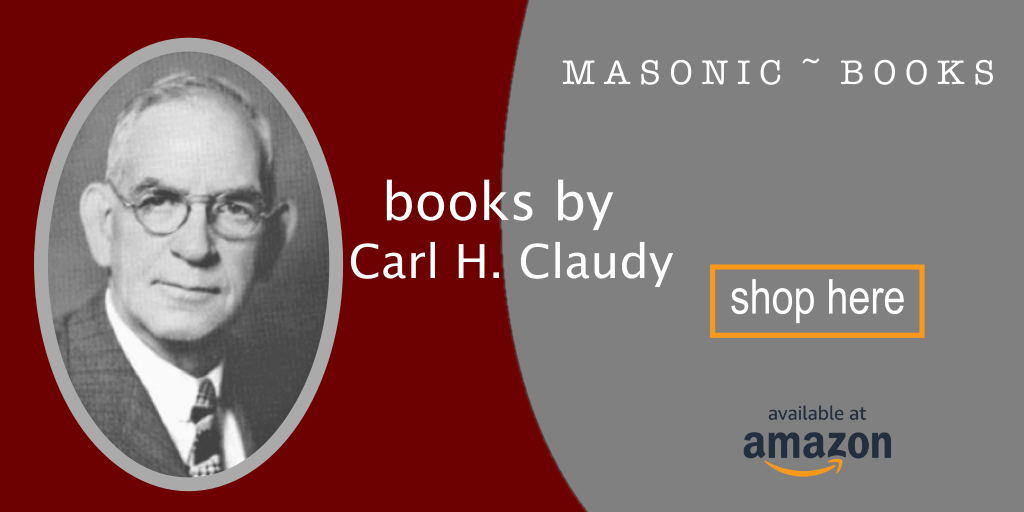The Entered Apprentice receives a monitorial explanation of these which is both round and full, but neither full nor round enough to instruct him wholly in these three foundation stones of the Ancient Craft.
Nor can he receive that roundness and fullness of explanation by words alone.
He must progress through the degrees, attend his lodge, see the Fraternity in action, fully to understand all that Freemasonry means by Brotherly Love, Relief, and Truth.
But a word or two may clear away some possible misapprehensions. Brotherly Love is not a sentimental phrase. It is an actuality. It means exactly what it says; the love of one brother for another.

Charcoal illustration by Lee Woodward Zeigler. Original size: 17.2 cm X 14 cm. Reprinted from a plate inserted after page 2000 of The History of Freemasonry, Its Legends and Traditions, Its Chronological History, by Albert Gallatin Mackey. Published by The Masonic History Company, New York and London: 1906. Volume Seven. [Templar Edition: Number 171 of 750.]
IMAGE LINKED: Grand Lodge of British Columbia and Yukon A.F. & A.M.
These are what are termed the Masonic Virtues of Brotherly Love, Relief and Truth. The Christian Graces are Faith, Hope and Charity. The four Cardinal Virtues are Justice, Prudence, Temperance and Fortuitude.
In the everyday world brothers love one another for only one reason. Not for blood ties alone; we have all known brothers who could not ‘get along’ together.
Not because they should, not because it is ‘the thing to do’, but simply and only because each acts like a brother.
Freemasonry has magic with which to touch the hearts of men but no wizardry to make the selfish, unselfish; the brutal, gentle; the coarse, fine; the bad, good. Brotherly Love in Freemasonry exists only for him who acts like a brother.
It is as true in Freemasonry as elsewhere that ‘to have friends, you must be one’.
ask not what a brother can do for you
but what you can do for a brother
The Freemason who sees a Square and Compasses upon a coat and thinks, ‘There is a brother Mason, I wonder what he can do for me’, is not acting like a brother. He who thinks, ‘I wonder if there is anything I can do for him’, has learned the first principle of brotherhood.
‘You get from Freemasonry just what you put into it’, has been so often said that it has become trite – but it is as true now as when first uttered.
One may draw checks upon a bank only when one has deposited funds. One may draw upon Brotherly Love only if one has Brotherly Love to give.
The Entered Apprentice is obligated in a lodge which wants him; all its members are predisposed in his favour. They will do all in their power to take him into the Mystic Circle.
But the brethren cannot do it all; the Entered Apprentice must do his part.
Luckily for us all the Great Architect so made his children that when the heart is opened to pour out its treasures, it is also opened to receive.
The Entered Apprentice learns much of Relief; he will learn more if he goes farther. One small point he may muse upon with profit; these words he will often hear in connection with charity, ‘more especially a brother Mason’. St. Paul said (Galatians vi, 10);
‘As we have therefore opportunity, let us do good unto all men, especially unto them who are of the household of faith.’
Freemasonry has no teachings that a Mason should not contribute to other charities. The continually insistent teaching of charity through all the three degrees, especially the Entered Apprentice’s Degree excludes from charity no one.
Without dependence societies, nations, families, congregations, could not be formed or exist. But the very solidity of the group, predicated upon mutual dependence, also creates this idea of distinction in relief or friendship or business as between those without and those within the group.
This feeling is universal. The church gives gladly to all good works but most happily to relieve those ‘who are of the household of faith’.
Our government considers the welfare of its own nationals before that of the nationals of other governments. The head of a family will not deny his own children clothes to put a coat upon the back of the naked child of his neighbour.
Those we know best, those closest, those united in the tightest bonds come first, the world over, in every form of union.
Naturally, then, a Mason is taught that while in theory for all, in practice charity is for ‘more especially a brother Mason’.
The final design of Freemasonry is its third principal tenet – the imperial truth. In some aspects truth seems relative, because it is not complete.
Then we see it as through a glass, darkly. But the ultimates of truth are immutable and eternal: the Fatherhood of God; the immortality of the soul.
As two aspects of the same object may seem different to different observers, so two aspects of truth may seem different. It is this we must remember when we ask, ‘What is truth in Freemasonry?’
It is the essence of the symbolism which each man takes for himself, different as men are different, greater as perception and intelligence are greater, less as imagination and understanding are less.
We are told, ‘On this theme we contemplate’ – we think of the truths spread before us and understand and value them according to the quality of our thinking.
Doubtless that is one reason for the universal appeal of Freemasonry; she is all things to her brethren and gives to all of us of her Truth in proportion to our ability to receive.
Article by: Carl H. Claudy
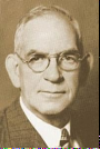
Carl Harry Claudy (1879 – 1957) was an American author, magazine writer, and journalist for the New York Herald.
His association with Freemasonry began in 1908, when, at the age of 29, he was raised a master Mason in lodge Harmony No. 17 in Washington, DC. He served as its master in 1932 and eventually served as Grand Master of Masons in the District of Colombia in 1943.
His Masonic writing career began in earnest when he became associated with the Masonic service Association in 1923, serving as associate editor of its magazine, The master mason, until 1931.
Under his leadership the service Association was brought to a place of predominance through his authorship and distribution of the short talk bulletin which made his name familiar to virtually every lodge in the country.
 Old Tiler Talks - Eyes Lifted High The Old Tiler Talks first published in 1925, by Carl Claudy, is a series of short anecdotal stories told in the setting of a new member asking an old tiler for his opinion on various masonic topics. These short articles are still very relevant, 100 years on, and hopefully provide some insight to new members today. |
 Old Tiler Talks - Masonic Libraries The Old Tilers talks first published in 1925, by Carl Claudy, is a series of short anecdotal stories told in the setting of a new member asking an old tiler for his opinion on various masonic topics. These short articles are still very relevant, 100 years on, and hopefully provide some insight to new members today. |
 Old Tiler Talks - So Many Rascals "Why are there so many rascals in the Fraternity, and why don't we turn them out?" a new member voiced to the old tiler for his opinion. These short articles are still very relevant, 100 years on, and hopefully provide some insight to new members today. |
 Old Tiler Talks - The Greatest Work The Old Tiler asked, "what is the greatest work of Masonry?" The New Brother sat by the guardian of the door and pulled out his cigar case. - Another instalment of wisdom by Carl Claudy, The Greatest Work |
 Old Tiler Talks - Why Men Love Freemasonry The 'Old Tiler Talks' first published in 1925, by Carl Claudy, is a series of short anecdotal stories told in the setting of a new member asking an old Tiler for his opinion on various Masonic topics. These short articles are still very relevant, 100 years on, and hopefully provide some insight to new members today. |
 Old Tiler Talks - Seeking a Little Light The Old Tilers talks first published in 1925, by Carl Claudy, is a series of short anecdotal stories told in the setting of a new member asking an old tiler for his opinion on various masonic topics. These short articles are still very relevant, 100 years on, and hopefully provide some insight to new members today. |
 The new mason laments that practically speaking, Masonry is a failure, and it depresses me … Masonry cannot be a failure, because men fail as Masons. The Old Tilers talk by Carl Claudy |
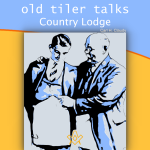 Old Tiler Talks - Country Lodge A lesson in the importance of an open mindset to observe, not to judge, but to learn and accept that we can achieve the desired outcome employing a different process. by Carl Claudy |
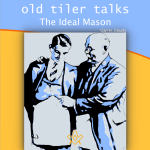 Old Tiler Talks - The Ideal Mason "What's your ideal of Freemasonry?" asked the Younger Mason - A short anecdotal story told in the setting of a new member asking an old tiler for his opinion on various masonic topics by Carl Claudy |
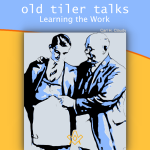 Old Tiler Talks - Learning the Work A short anecdotal story told in the setting of a new member asking an old tiler for his opinion on various masonic topics by Carl Claudy |
 Masonic first appointments and promotions might appear to be inequitable for one point a view, but some times, one point does not show the whole picture. A perfectly articulated story by Claudy, we should not compare one persons abilities with another. |
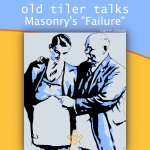 Old Tiler Talks - Masonry's 'Failure' Masonry fails because it doesn’t interest men sufficiently to make them practice what they preach. A perfectly articulated story by Claudy Masonry does not fail men. Men fail Masonry. Masonry has the teachings. |
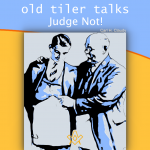 A perfectly articulated story by Claudy reminds us of a lesson from the Second Degree Charge; in the decision of every trespass against our rules, judge with candour, admonish with friendship, and reprehend with mercy. |
 Old Tiler Talks - A Masonic Speech A Masonic Speech - I can tell you the essence of appeal. It is drama. If you want your hearers to hang on your words, dramatize your subject |
 Old Tiler Talks - A Mason's Christmas A Mason's Christmas - Do you believe in Christmas celebrations should be held by the lodge ? Should members be asked to contribute to one and engage in Christmas festivities ? What is the old tilers take on this ? |
 Advertising - We would do more good in the world if we advertised ourselves more… Why ? |
 Uncover the mystery behind one of the oldest and most widespread symbols denoting God. |
 Do you want to discover the originals of the five points of fellowship ? |
 The mystery behind the two great pillars that stood at the porchway entrance of King Solomon Temple |
 Three numbers, what are their masonic significance? Pythagoras has something to say about them |
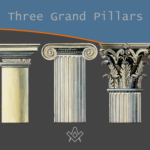 What are the Three Grand Pillars ?, wisdom, strength, and beauty - then later we hear of the Doric, Ionic, and Corinthian columns |
 This emblem contains more real food for thought than any other in the lecture of the Sublime Degree. |
 The Hiramic Legend is the glory of Freemasonry; the search for that which was lost is the glory of life |
 How are the Fellowcraft's five steps connected the five senses of human nature |
 How to explain the principle tents of the craft to a newly made brother |
 What are the lesser lights and where are they placed on our Lodges |
 Like so much else in Freemasonry the Middle Chamber is wholly symbolic |
 In the true sense of the words Freemasonry is not a secret society but a society with secrets. |
 Three Great Lights – the Volume of the Sacred Law, the Square, and the Compasses |
 Entered Apprentice Lambskin Apron; More ancient than the Golden Fleece or Roman Eagle, more honourable than the Star and Garter ... |
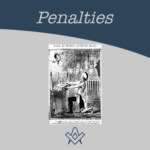 To the initiate, the penalty in his obligation comes with a shock of surprise and sometimes consternation. |
 What is a point within a circle |
masonic knowledge
to be a better citizen of the world
share the square with two brothers

click image to open email app on mobile device



